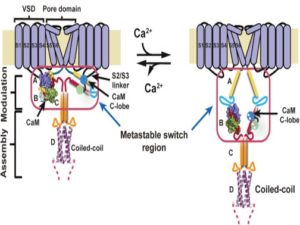 The Kv7 family of voltage-gated potassium channels control excitability in the heart, brain, and ear, and harbor mutations associated with arrhythmias, epilepsy, and deafness. A recent study, led by Molecular Biophysics and Integrated Bioimaging (MBIB) faculty scientist Daniel Minor’s group in the Cardiovascular Research Institute at UCSF, revealed a universal switch mechanism by which the calcium sensor protein calmodulin controls the action of these channels. This research collected and integrated data from both diffraction and scattering beamlines at the Advanced Light Source (ALS) and was coordinated through the recently funded ALS-ENABLE collaborative program. The findings, reported in the journal Neuron, provide a key link between Kv7 channel activity and cellular signaling pathways. Greg Hura, a research scientist in MBIB, was also a co-author on the paper. Watch a video detailing the work.
The Kv7 family of voltage-gated potassium channels control excitability in the heart, brain, and ear, and harbor mutations associated with arrhythmias, epilepsy, and deafness. A recent study, led by Molecular Biophysics and Integrated Bioimaging (MBIB) faculty scientist Daniel Minor’s group in the Cardiovascular Research Institute at UCSF, revealed a universal switch mechanism by which the calcium sensor protein calmodulin controls the action of these channels. This research collected and integrated data from both diffraction and scattering beamlines at the Advanced Light Source (ALS) and was coordinated through the recently funded ALS-ENABLE collaborative program. The findings, reported in the journal Neuron, provide a key link between Kv7 channel activity and cellular signaling pathways. Greg Hura, a research scientist in MBIB, was also a co-author on the paper. Watch a video detailing the work.




